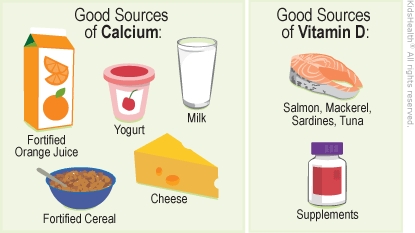To build strong bones, kids need calcium, vitamin D, and physical activity. It's best for kids to get their calcium from food. Because many kids don't get enough vitamin D naturally, healthcare providers often recommend they take a supplement.


Calcium: Make sure your child gets enough calcium from food. Good natural food sources are milk, yogurt, cheese, beans, leafy greens such as broccoli and kale, figs, almonds, and sesame seeds. Some brands of orange juice, breakfast cereal, and other foods have added calcium (these products are labeled "fortified").
Vitamin D (also called vitamin D3): The body gets vitamin D from the diet and can also make vitamin D when sunlight reaches the skin. Even with a healthy diet, it's not always easy for babies, kids, and teens to get enough vitamin D.
For Babies
Babies under 1 year need 400 IU (international units) of vitamin D each day. Breast milk is best for babies, but it doesn't have enough vitamin D. Give babies who drink breast milk vitamin D drops or a multivitamin drop that contains vitamin D as recommended by your healthcare provider. Formula has vitamin D added. Babies who drink 32 ounces (about a liter) or more of formula each day don't need a vitamin D supplement.
For Kids and Teens


What do calcium and vitamin D do? Vitamin D helps the body absorb the two basic building blocks of bone: calcium and phosphorous. Without enough calcium, bones can grow too slowly and become soft, weak, broken, or deformed.
How do I know if my kids are getting enough calcium and vitamin D? Kids who eat healthy diets get most of their vitamins naturally, but it's hard to get enough vitamin D through food. And some kids can't eat dairy because of an allergy, so they may have trouble getting enough calcium in their diet. Talk to your healthcare provider about how much calcium and vitamin D your child is getting. They may recommend calcium or vitamin D supplements, diet changes, or that your child spend a few minutes in the sun every day if they think your child isn't getting enough of the vitamins and minerals they need. If necessary, your healthcare provider may order a blood test.